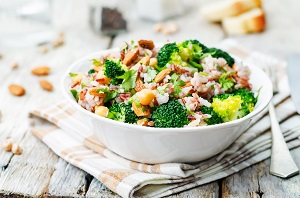MEDIA // NEWS

Vegetarians Now Have More Options Than Tofu
November 18, 2025 at 4:00 PM EST.Vegetarianism doesn’t automatically equal a healthy diet, although that’s a common misconception. In fact, a vegetarian diet done the wrong way could actually be just as detrimental as an unhealthy diet full of processed and sugary foods.
It’s all about how you’re replacing animal products. If your idea of vegetarian is French fries cooked in vegetable oil, or sugary granola bars throughout the day, you could end up actually gaining weight, having a lot of inflammation and becoming iron-deficient. And if you’re just tired of tofu, you’re in luck. As vegetarian and vegan diets have become more and more popular over the years, the time of tofu everything is no more. Now, you have options.
Here are some great alternatives to both meat and tofu that you can easily add to your diet:
Quinoa- You’re probably already aware of this “superfood”, whose profile has risen significantly over the past few years. Officially pronounced “Kee-no-ah”, commonly pronounced “keen-wahhh”, quinoa is a seed that is packed full of protein. Generally, a cup equals about 8 grams of protein, and it’s one of the only non-meat options featuring nine essential amino acids your body can’t produce on its own. (That includes lysine, which is used for both tissue growth and repair.) It is also a great source of fiber, iron, magnesium and manganese, and there’s hundreds of variations and ways to prepare it. Most commonly, it’s used as a rice and pasta alternative.
Beans- These may be a no-brainer for anyone looking to cut back or eliminate meat from their diet; that’s because it’s the most popular plant-based source for protein. Garbanzo beans in particular are useful for vegetarians because of their versatility. They serve up 12 grams of protein per cup, and can be served as a side dish, ground up for dips and hummus, or sprinkled on salad. Kidney beans provide 15 grams of protein per cup and perfect for vegetarian soups and stews.
Leafy greens- While most people interested in becoming vegetarian or vegan are concerned about replacing their protein, what many forget about is iron. In fact, even without cutting meat from your diet, chances are pretty high that you could be suffering from an iron deficiency- it’s the most common vitamin deficiency in the world. Iron transports oxygen from your lungs to your cells, and it’s most easily absorbed from animal foods. However, you can get it from plants, you just need to eat bigger quantities. Dark leafy greens like spinach and kale are the best way to get it, but fortified breads and cereals also provide iron. Pair them with vitamin C rich foods like tomatoes, citrus and potatoes to help absorb the iron better.
Soy milk- Vitamin B12 also plays a major role in your body- impacting DNA synthesis and creating red blood cells, as well as help the body turn food into energy. Since it only occurs naturally in animal-based foods, vegetarians who continue to eat eggs and milk are probably ok. But vegans need to turn elsewhere for B12. Most nondairy milk alternatives add B12, including fortified soy milk. In addition, fortified cereals can help fill the B12 hole.
Iodized salt- While too much salt is always a bad idea, iodized salt when necessary is great for vegetarians. Iodine- vital to thyroid health- is found in seafood but is lacking in most vegetarian and vegan diet. In fact, studies have shown 80 percent of vegans and 20 percent of vegetarians are lacking. The easy solution is to use iodized salt when cooking and eating. (Seaweed is another option to incorporate more iodine into your diet.)
Nuts and nut butters- This is one food item that you do need to moderate. Nuts and nut butters are very high in protein (5-6 grams of protein per ounce). However, they’re also high in calories. Nutritionists suggest sticking with plain nuts and nut butters, without oils or sugar. You can get dry roasted, or look for butters labeled “just peanuts”. Some added salt is ok, and adding nuts or nut butters to other food items like whole wheat toast or raw vegetables always creates a tasty, satisfying and healthy snack.
